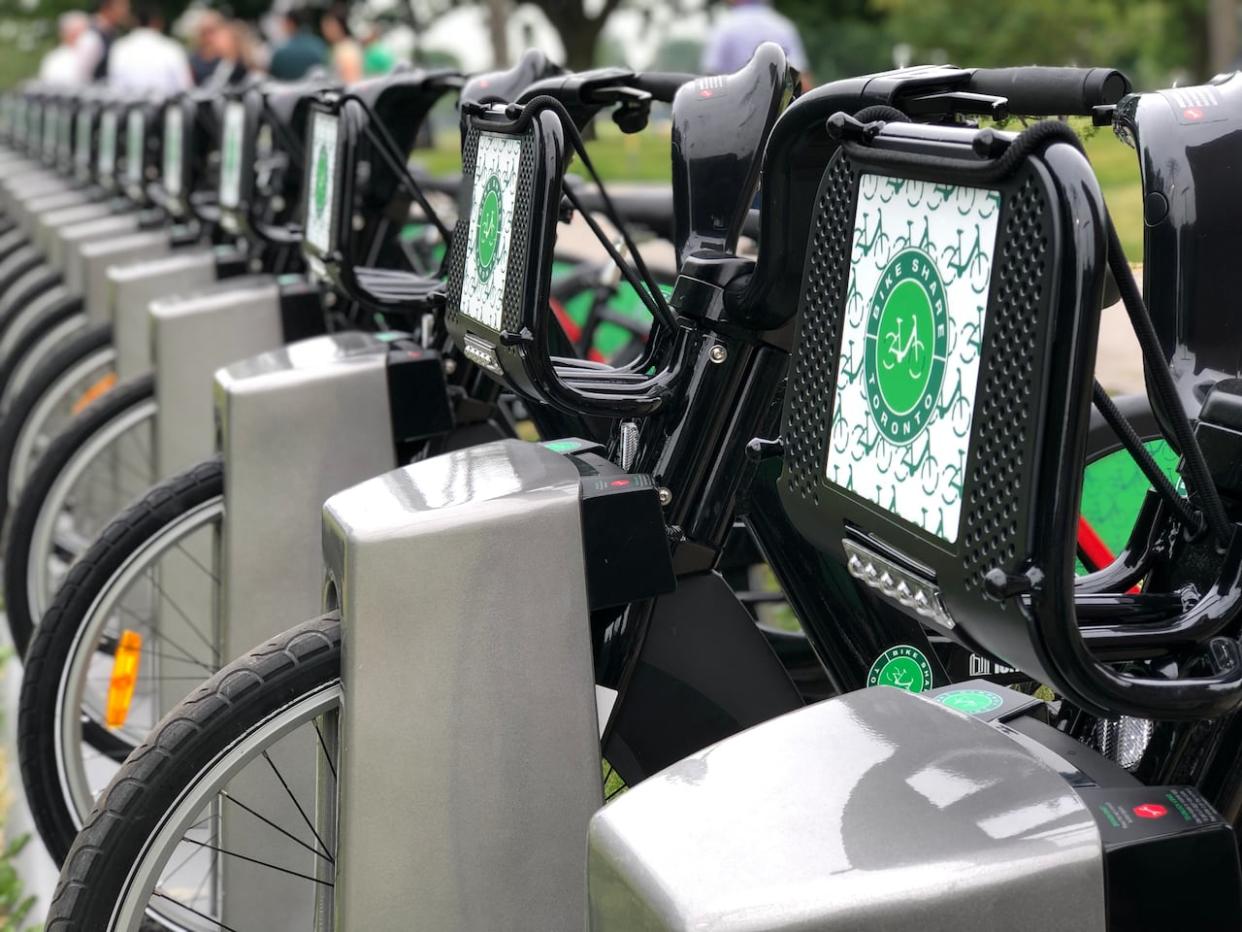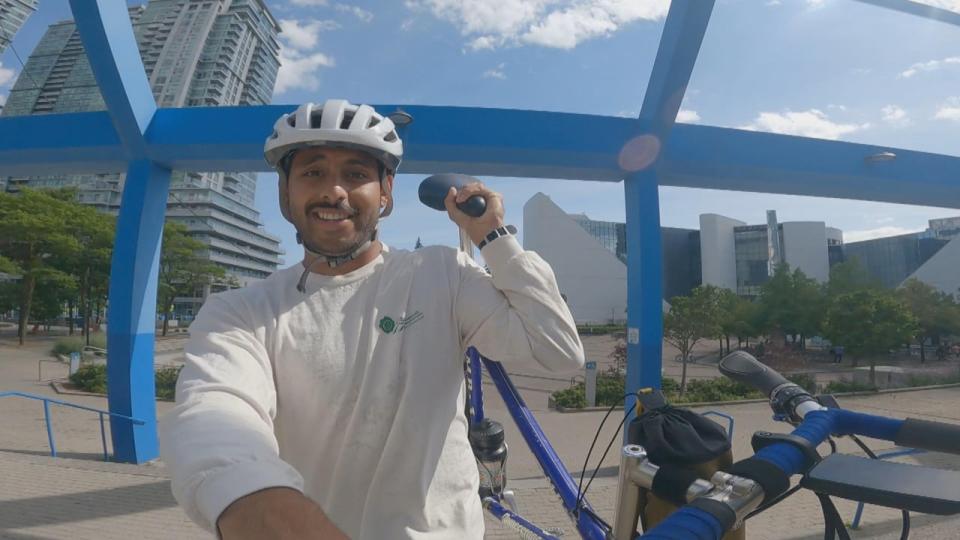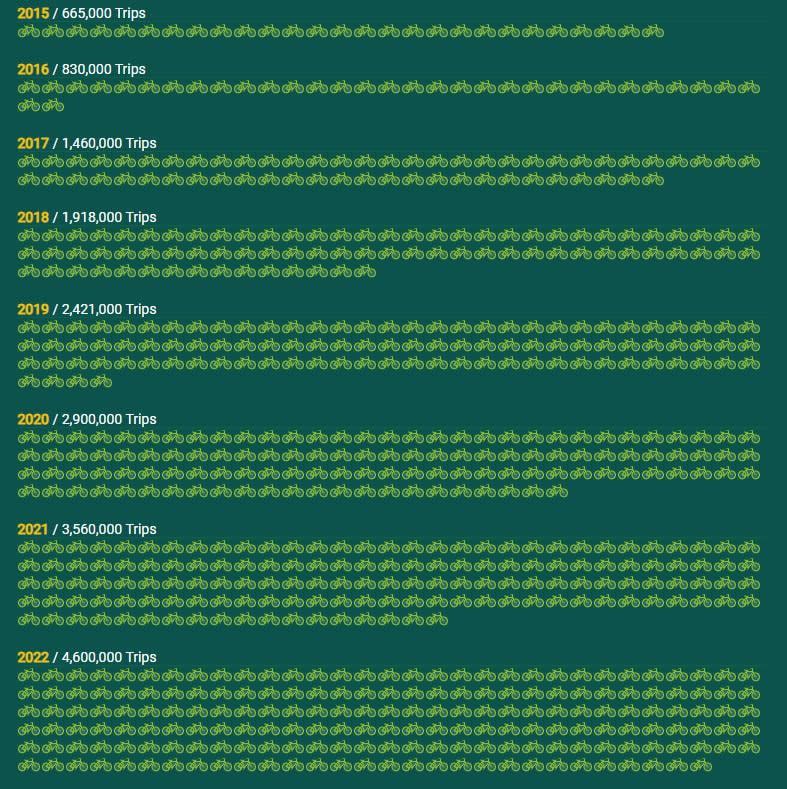Bike sharing in Toronto has exploded over the years, but parts of the city remain underserved

New numbers on bike sharing in Toronto show more riders are using the service than ever before, but some say the service needs to expand further into underserved parts of the city to be equitable.
According to a new data visualization project conducted by the University of Toronto's School of Cities, ridership increased from about 665,000 trips in 2015 to over 4.5 million in 2022.
"There is an increasing interest in riding bikes in the city," said Michael Liu, an urban data analyst at the university. "A lot of people are putting money into this system to bring more bikes and bring more stations into the system."
And it's not just the number of trips that have steadily increased year over year. While trips per station and trips per bike have both increased, data shows monthly ridership has also increased over the years.
In the last year alone, ridership increased by 28 per cent over 2022. And while most users are taking trips in the summer, winter usage is also on the rise.
"It is very encouraging, particularly this past winter, to see how much this jumped," said Jeff Allen, data visualization lead at the School of Cities at the University of Toronto. "Maybe we had…more days where there was less snow."
Liu says the city's efforts to clean up snow from from bike lanes is an important part of that.
"Biking in the winter pretty easy as long as you're prepared for it," he said.
Need greater with Scarborough RT closure
But despite the increase in ridership, the number of operating bike share stations has only increased incrementally since 2021, according to the data. Allen says that could be due to a lack of funding, but says the city needs to prioritize funding to help facilitate growth.
Gurinder Sandhu, co-founder of Drive Side, a cycling collective aimed at reducing barriers to cycling, says while there maybe be a comprehensive bike share system in some parts of the city, that's not the case for areas like Jane and Finch and Scarborough.
"There's fewer bike lanes in Scarborough, but more importantly, there are fewer bike stations," he said.
With the Scarborough Rapid Transit line officially out of commission, Sandhu says residents need bikes now more than ever.

Gurinder Sandhu says while he's happy to see more people using Bike Share, the program isn't city-wide just yet. And with Scarborough residents losing a key piece of transit infrastructure, the need for the service there is greater than ever, he says. (Go Pro/CBC)
"We've now associated the idea of cycling with people who are wealthy, unfortunately, because there's a barrier," said Sandhu.
More biking and bike sharing infrastructure in such areas would send an important message, he said.
"You don't need to invest several [hundred dollars] in buying your own bike. You can pay $7 for unlimited bike usage during the entire day — cheaper than TTC fare if you use it going two ways. That is a very low cost of entry and would mean that a whole new segment of Torontonians would be able to access cycling as their primary mode of transit."
Expansion, accessible fares coming: Bike Share director
In 2022, the Toronto Parking Authority released a four-year growth plan to expand bike share docks and bikes into other parts of the city.
Justin Hanna, director of Bike Share Toronto, says one reason bike station growth has been incremental in recent years is that the parking authority had a big expansion that ended in 2020 and took the following year to develop their next growth plan.
Hanna says there will be 110 to 130 new stations coming each year for the next three years though to 2025.
"That will bring this network to 1000 stations across the entire city," said Hanna. According to the plan, there will also 10,000 bikes in circulation including 2,000 e-bikes, by that point.
"Bike share is moving from being more of an urban sort of downtown system to now is going to be a city-wide transportation network," he said.

According to a new data visualization project from University of Toronto's School of Cities, Bike Share Toronto ridership increased from about 665,000 trips in 2015 to over 4.5 million in 2022. (University of Toronto)
But with the Scarborough RT gone, Hanna acknowledges there is an opportunity to target expansion along the corridor.
Currently there are 21 stations in all of Scarborough, with 20 more being installed by the end of the year. By the end of 2025, there will be 138 stations installed, he says.
"One of the ways [Scarborough residents] want to use bike share…is use it as first and last mile," Hanna said. "But also connect it to rapid transit routes that are coming live over the next number of weeks."
The service will also be expanding into the Thorncliffe Park and Jane and Finch communities in the next six to 12 months, he says.
Joey Schwartz, a member of the Toronto Bicycling Network and one of the earlier members of Bixi before it became Bike Share, says though bike sharing is a more affordable transportation option, the cost of entry can still be a barrier for many.
"There should be more programs to make sure that people of limited means can actually get bike share," he said.
Hanna says Bike Share is currently exploring a fare pass program that could allow some to access the service at a reduced rate.


